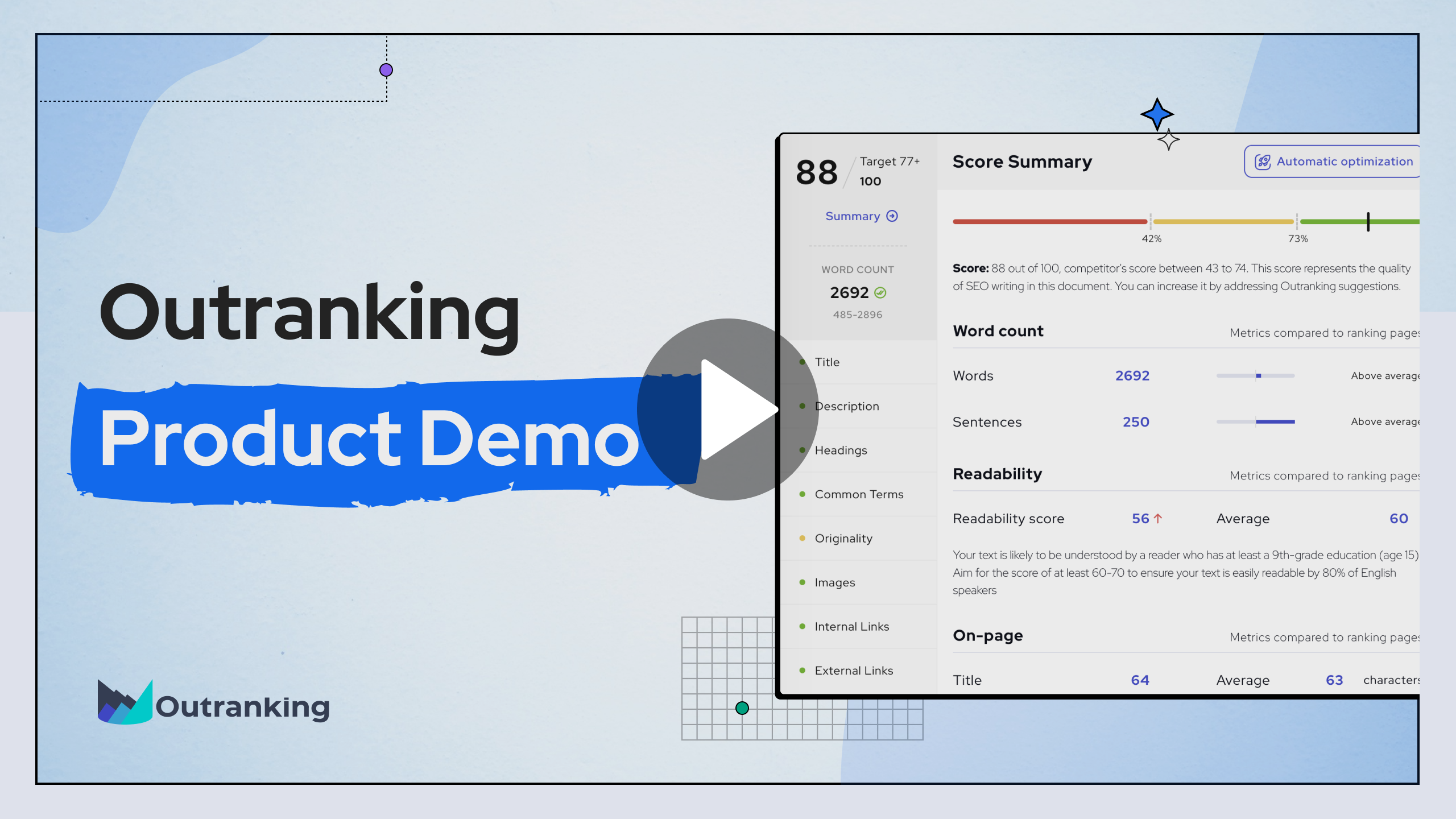- Product
- SEO Content Editor
- SEO Content Strategy
- Content Optimization
- Content Briefs
- AI Assisted Writing
- Keywords Clustering
Preview a demo walkthrough
Outranking the competition with our cutting-edge SEO strategies.

- Pricing
- Resources
- Sign In
- Get Started

Table of Contents
Blogging has the potential to quickly take you to interesting and exciting places. All it takes is one blog post, shared on social media or published online, that goes viral.
But what if you don’t know how to write an engaging blog bio? What happens if people search for you and find nothing but terrible content written by others?
It’s not easy getting people to read what you write online anymore, with heavy competition from social media and other sites. There are millions of blogs out there, which means less visibility for websites like yours and more difficulty with advertising.
One way to get an edge is to write a great bio for your blog. This article covers everything from the importance of writing a blog bio to what you should and shouldn’t include. You can create a compelling bio by following the tips below.
Table of Contents
What is a blog bio?
A blog bio is a short paragraph that explains why your blog is worth reading. It should include the professional skills you bring to the table and demonstrate that you can help people solve their problems.
Some important points to consider when you write your blog bio are:
- Your blog’s story
- Your mission or vision
- Your qualifications
Brainstorming around these topics will help you develop solid points for your biography that show why your blog is valuable. Take some time to gather your thoughts before composing your own blog bio.
Why is a blog bio so important for an author?
A blog bio establishes the credibility of your website or brand
A blog bio establishes credibility for an author by providing accurate and up-to-date information about them.
An ideal blog bio is easy to read and provides a concise explanation of the author’s experience and qualifications, including relevant academic degrees and other professional credentials.
A blog bio builds trust and showcases your credentials
A good blog bio can build trust with potential readers by providing information about your blog’s content and focus. Be honest and engaging to keep readers coming back for more.
A blog bio helps you to connect with your audience
Your name is the first thing people see on your blog, so make sure it’s there! Also, only include details about yourself that relate to your audience’s problem.
For example, if you’re an expert on gardening, don’t include information about your love of country music. Instead, focus on how you can help solve their gardening problems.
When introducing yourself, be sure to include both your blog name and a brief description of what it’s about. This will help people see what to expect from your posts.
Finally, carefully select a few facts about yourself that will impress your audience and show that you’re qualified to help them.
A blog bio boosts search engine optimization (SEO)
Author bios are important for boosting SEO because they add value to your content. By including a blog bio on your website, you can help Google to see your content as more valuable and thus rank it higher in search results.
Even if your website doesn’t have many links from other high-profile websites, sites with good content can still rank well.
12 tips for writing a good blog bio
1. Make it short, sweet, and attention-grabbing
Keep your bio brief and to the point by using a dedicated author box to limit the space. The more notable an author is, the shorter their author bio can be. Try to avoid long paragraphs by using active and vivid verbs to capture your reader’s attention.

2. Be yourself
When writing your blog bio, be open and authentic. Don’t try to stretch the truth or make your story more interesting than it is. If your readers find out you lied, it will be hard to regain their trust.
Write a sincere and easy-to-read explanation in short passages about who you are and what you do. Be sure to include any relevant details that help your readers to get to know you better.
3. Tell your story and use your own writing style
We all have a story to tell, and sharing our stories can be a great way to connect with others. When it comes to writing a blog, it can be difficult to know how much to share.
You want to come across as both professional and relatable, but you don’t want to overshare or bore your readers.
Here are some tips for striking the perfect balance:
- Start with the basics. Include your name, what you do, and why your readers should care. Give people a good overview of you as a person and what you care about.
- Share your story. Don’t be afraid to open up about your experiences, both good and bad. This will help people see that you’re human and that they can relate to you.
- Be helpful. Use your platform to share useful information that will help your readers in some way. Whether it’s tips on how to improve their businesses or simply ways to make their lives easier, this type of content is always appreciated by readers.
Here is an example from AJ Clarke, the Owner of WPExplorer:

4. Use keywords and facts
If you want people to be able to find your blog easily, make sure to use keywords throughout your post and also in your bio. Doing keyword research can help you find relevant keywords to use.
This will help people find your blog more easily when they are searching for topics that you write about.
5. Use the third-person point of view
It’s your choice whether you write in the first or third person. We recommend that you use the third-person point of view in your blog bio and include your name in the first two words of the first sentence.
When writing in the third person, the narrator is not a person in the text. In this case, you would refer to yourself with third-person pronouns like “he,” “she,” or “they.”
This perspective can be helpful in creating distance between the author and the text, which can sound more objective.
Here is what I mean:
![How to Write a Blog Bio: 12 Actionable Tips for Writing Blog Bios 13 How to Write a Blog Bio: 11 [Actionable] TipsA blog bio helps to boost SEOA blog bio helps to connect with the audienceA blog bio helps to establish credibility"""](png/httpscdn.wpbeginner.comwp-contentuploads202106syed-author-bio.png)
6. Highlight your unique selling point (USP) and personality
Your blog bio is your chance to tell potential readers what makes your blog unique. Think about what sets your blog apart from others in your niche and highlight that.
A strong USP is essential for a successful blog, so take the time to craft a bio that tells readers what you’re offering on your site.
7. Use positive language in your blog bio
If you want your blog bio to be more engaging, use positive language (and limit your use of “not”). Write in short, clear paragraphs that are easy to understand, and focus on your strongest points.
8. Focus on what you can do for the reader and not on selling something
When composing your blog bio, focus on what the reader can gain from reading your article. By thinking of your bio as a well-composed paragraph, you can ensure that the reader will be able to understand how they can benefit from your writing.
9. Add a call to action
A call to action is a statement or request that urges the reader to take a specific, desired action. A call to action should be clear and concise, and it should align with the overall goal of your blog post or article.
When adding a call to action to your bio, make sure it is relevant to your content. This can encourage your readers to take further action, such as subscribing to your blog, following you on social media, or visiting your website.
Here is a good example of a blog bio with a call to action:
![How to Write a Blog Bio: 12 Actionable Tips for Writing Blog Bios 14 How to Write a Blog Bio: 11 [Actionable] Tips A blog bio helps to boost SEO A blog bio helps to connect with the audience A blog bio helps to establish credibility"""](jpg/httpsconversionsciences.comwp-contentuploads201709henneke-duistermaat-copyblogger.jpg)
10. Check for grammar and spelling errors
It is important to check for mistakes in your blog bio for a few reasons. First, it can help you improve your knowledge of the English language. Second, it shows that you are professional and take pride in your work. Third, it can help you avoid embarrassing yourself or offending others.
There are many grammar checker tools available online that can help you find and correct these issues.
11. Update your bio regularly
Update your bio regularly to ensure that it accurately reflects you and the content of your blog. This will help you build trust with your readers and keep them engaged.
In addition, by including relevant keywords and phrases, you can ensure that your bio is easily found by those who are interested in what you have to offer.
12. Include contact details or a social media handle
When creating a blog, include various ways for potential readers to contact you. This can be in the form of an email address, social media handles, or a link to your website.
By including this information in your bio, you are making it easier for people to connect with you and learn more about your work. In addition, including links to your social media profiles can help increase your reach and followers.
![How to Write a Blog Bio: 12 Actionable Tips for Writing Blog Bios 15 How to Write a Blog Bio: 11 [Actionable] Tips A blog bio helps to boost SEO A blog bio helps to connect with the audience A blog bio helps to establish credibility](png/httpswww.wisevu.comwp-contentuploads202009about-the-author-1.png)
Examples of great author bios
An author bio should be easy to read and flow nicely. It should provide an explanation of who the author is, what they do, and why they do it. Great author bios provide a brief overview of the author’s work, hobbies, or other interests.
Blog bio example for a personal website: Chimamanda Ngozi Adichie

For Chimamanda Ngozi Adichie, the bio begins with an invitation into her world. It talks about her work as an author and public speaker, as well as some of her recent projects.
The biography also highlights where she is from and ends with a call to action for readers to learn more on her personal website.
Marriage therapist blog bio example: Lena Axelsson

Lena Axelsson is a family therapist by profession. Lena uses a first-person narrative in her professional bio, beautifully describing herself and how she became a marriage therapist. Her blog bio is engaging and informative.
Niche blog author: Julia Jenkins

Julia Jenkins is an information junkie and the founder of Bloggbuddy, a blog management platform. She has helped blog owners create and manage content in a variety of ways, including through her own blog.
Julia’s bio shows that she is passionate about helping others get the most out of their content. This bio is written in the third person, lending an objective tone to the text.
Conclusion
A blog bio is an important part of your blog, and it can help to boost SEO as well as establish credibility. This insight is crucial for those asking “can I do SEO on my own“. To write a strong bio, brainstorm around topics that are important to you, then take some time to write down ideas before composing your bio.
This will help you create a well-rounded and informative biography.
FAQs
Are blog bios important for bloggers?
Blog bios are important for a variety of reasons. They tell readers that your website has the answers they’re seeking, and they can help you position your site as an authority on the topic.
To create a compelling bio, you can use a mixture of different techniques, such as including your professional experience, sharing quotes from others that have mentioned you, or highlighting your areas of expertise. Make sure that your bio is accurate, concise, and helpful so that readers will know what to expect when they visit your website.
Can I have my site name in the bio for a guest post?
When you write a guest post for another blog, it’s customary to include a brief bio about yourself. This gives the reader a general sense of you and your credentials. In many cases, you’ll also be allowed to include a link to your own website or blog.
However, be aware of any potential copyright or trademark issues with your blog’s name. You may want to consult an attorney if you think your name overlaps with someone else’s.
Are there software for writing “about me” posts?
There are a variety of software options available for helping you write your “about me” post or biography. One option is Copy.AI’s Free Bio Generator, which allows you to create social media bios in seconds. With this tool, you no longer have to try and be clever and witty – you can easily create a bio that accurately reflects your personality and interests.
What are the best ways to show experience and passion for a topic in a bio?
When writing a blog bio, you will want to focus on your professional accomplishments and how they have benefited others. You can use a few key points to highlight what you have done and why it matters. You can also use strong verbs to show what you have accomplished, as well as adjectives to describe your skills and experience in an engaging way.



